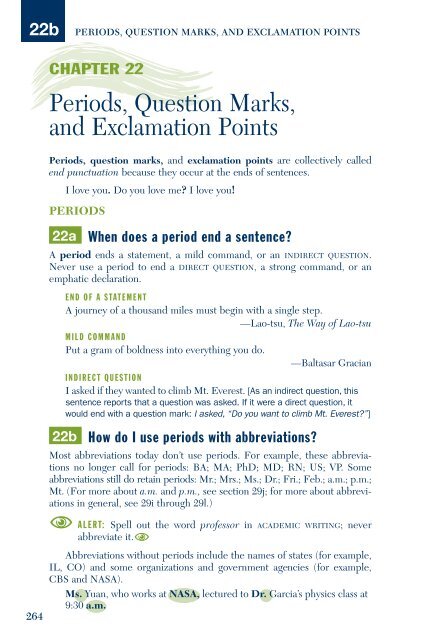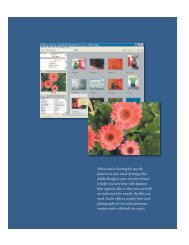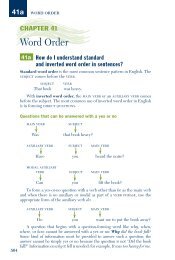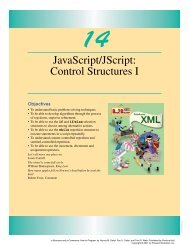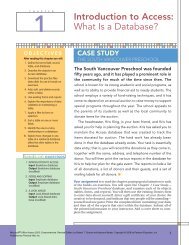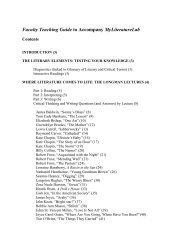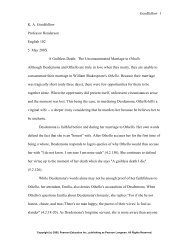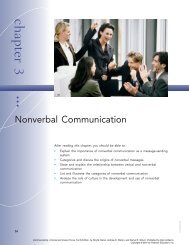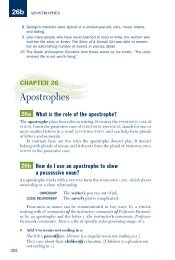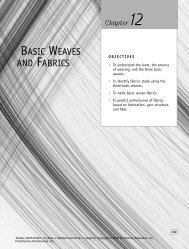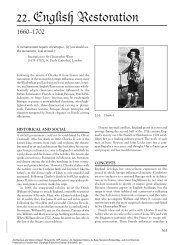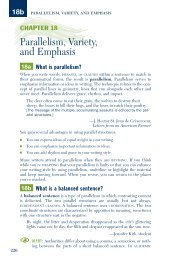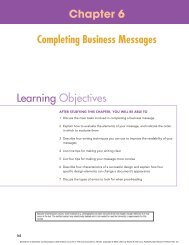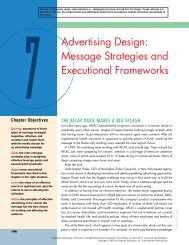CHAPTER 22 Periods, Question Marks, and Exclamation Points
CHAPTER 22 Periods, Question Marks, and Exclamation Points
CHAPTER 22 Periods, Question Marks, and Exclamation Points
You also want an ePaper? Increase the reach of your titles
YUMPU automatically turns print PDFs into web optimized ePapers that Google loves.
<strong>22</strong>b PERIODS, QUESTION MARKS, AND EXCLAMATION POINTS<br />
264<br />
<strong>CHAPTER</strong> <strong>22</strong><br />
<strong>Periods</strong>, <strong>Question</strong> <strong>Marks</strong>,<br />
<strong>and</strong> <strong>Exclamation</strong> <strong>Points</strong><br />
<strong>Periods</strong>, question marks, <strong>and</strong> exclamation points are collectively called<br />
end punctuation because they occur at the ends of sentences.<br />
I love you. Do you love me? I love you!<br />
PERIODS<br />
<strong>22</strong>a When does a period end a sentence?<br />
A period ends a statement, a mild comm<strong>and</strong>, or an INDIRECT QUESTION.<br />
Never use a period to end a DIRECT QUESTION, a strong comm<strong>and</strong>, or an<br />
emphatic declaration.<br />
END OF A STATEMENT<br />
A journey of a thous<strong>and</strong> miles must begin with a single step.<br />
—Lao-tsu, The Way of Lao-tsu<br />
MILD COMMAND<br />
Put a gram of boldness into everything you do.<br />
—Baltasar Gracian<br />
INDIRECT QUESTION<br />
I asked if they wanted to climb Mt. Everest. [As an indirect question, this<br />
sentence reports that a question was asked. If it were a direct question, it<br />
would end with a question mark: I asked, “Do you want to climb Mt. Everest?”]<br />
<strong>22</strong>b How do I use periods with abbreviations?<br />
Most abbreviations today don’t use periods. For example, these abbreviations<br />
no longer call for periods: BA; MA; PhD; MD; RN; US; VP. Some<br />
abbreviations still do retain periods: Mr.; Mrs.; Ms.; Dr.; Fri.; Feb.; a.m.; p.m.;<br />
Mt. (For more about a.m. <strong>and</strong> p.m., see section 29j; for more about abbreviations<br />
in general, see 29i through 29l.)<br />
ALERT: Spell out the word professor in ACADEMIC WRITING; never<br />
abbreviate it.<br />
Abbreviations without periods include the names of states (for example,<br />
IL, CO) <strong>and</strong> some organizations <strong>and</strong> government agencies (for example,<br />
CBS <strong>and</strong> NASA).<br />
Ms. Yuan, who works at NASA, lectured to Dr. Garcia’s physics class at<br />
9:30 a.m.
ALERT: When the period of an abbreviation falls at the end of a sentence<br />
that calls for a period, the period of the abbreviation serves also to end<br />
the sentence. If, however, your sentence ends in a question mark or an exclamation<br />
point, put it after the period of the abbreviation.<br />
The phone rang at 4:00 a.m.<br />
It’s upsetting to answer a wrong-number call at 4:00 a.m.!<br />
Who would call at 4:00 a.m.?<br />
QUESTION MARKS<br />
When can I use a question mark in parentheses? <strong>22</strong>d<br />
<strong>22</strong>c When do I use a question mark?<br />
A question mark ends a direct question, one that quotes the exact words<br />
the speaker used. (In contrast, an indirect question reports a question <strong>and</strong><br />
ends with a period.)<br />
How many attempts have been made to climb Mt. Everest? [An indirect<br />
question would end with a period: She wants to know how many attempts<br />
have been made to climb Mt. Everest.]<br />
ALERT: Never use a question mark with any other punctuation.<br />
NO She asked, “How are you?.”<br />
YES She asked, “How are you?”<br />
<strong>Question</strong>s in a series are each followed by a question mark, whether or<br />
not each question is a complete sentence.<br />
After the fierce storm, the mountain climbers debated what to do next.<br />
Turn back? Move on? Rest for a while?<br />
ALERT: When questions in a series are not complete sentences (as in<br />
the above example), you can choose whether to capitalize the first<br />
letter, but be consistent within each piece of writing.<br />
Sometimes a statement or mild comm<strong>and</strong> is phrased as a question to be<br />
polite. In such cases, a question mark is optional, but be consistent in each<br />
piece of writing.<br />
Would you please send me a copy.<br />
<strong>22</strong>d When can I use a question mark in parentheses?<br />
The only time to use a question mark in parentheses (?) is if a date or other<br />
number is unknown or doubtful. Never use (?) to communicate that you’re<br />
unsure of information.<br />
265
<strong>22</strong>f PERIODS, QUESTION MARKS, AND EXCLAMATION POINTS<br />
266<br />
Mary Astell, a British writer of pamphlets on women’s rights, was born<br />
in 1666 (?) <strong>and</strong> died in 1731.<br />
The word about is often a more graceful substitute for (?): Mary Astell was<br />
born about 1666.<br />
Also, never use (?) to communicate IRONY or sarcasm. Choose words to<br />
deliver your message.<br />
NO Having altitude sickness is a pleasant (?) experience.<br />
YES Having altitude sickness is as pleasant as having a bad case<br />
of the flu.<br />
EXCLAMATION POINTS<br />
<strong>22</strong>e When do I use an exclamation point?<br />
An exclamation point ends a strong comm<strong>and</strong> or an emphatic declaration. A<br />
strong comm<strong>and</strong> is a firm <strong>and</strong> direct order: Look out behind you! An emphatic<br />
declaration is a shocking or surprising statement: There’s been an accident!<br />
ALERT: Never combine an exclamation point with other punctuation.<br />
NO “There’s been an accident!,” she shouted.<br />
YES “There’s been an accident!” she shouted.<br />
YES “There’s been an accident,” she shouted. [Use this form if you<br />
prefer not to use an exclamation point.]<br />
<strong>22</strong>f What is considered overuse of exclamation points?<br />
In ACADEMIC WRITING, words, not exclamation points, need to communicate<br />
the intensity of your message. Reserve exclamation points for an emphatic<br />
declaration within a longer passage.<br />
When we were in Nepal, we tried each day to see Mt. Everest. But each<br />
day we failed. Clouds defeated us! The summit never emerged from a<br />
heavy overcast.<br />
Also, using exclamation points too frequently suggests an exaggerated<br />
sense of urgency.<br />
NO Mountain climbing can be dangerous. You must know correct<br />
procedures! You must have the proper equipment! Otherwise,<br />
you could die!<br />
YES Mountain climbing can be dangerous. You must know correct<br />
procedures. You must have the proper equipment. Otherwise,<br />
you could die!
Never use (!) to communicate amazement or sarcasm. Choose words to<br />
deliver your message.<br />
NO At 29,035 feet (!), Mt. Everest is the world’s highest mountain.<br />
Yet, Chris (!) wants to climb it.<br />
YES At a majestic 29,035 feet, Mt. Everest is the world’s highest<br />
mountain. Yet, Chris, amazingly, wants to climb it.<br />
EXERCISE <strong>22</strong>-1 Insert any needed periods, question marks, <strong>and</strong> exclamation<br />
points <strong>and</strong> delete any unneeded ones. For help, consult all sections of<br />
this chapter.<br />
EXAMPLE Dr Madan Kataria, who calls himself the Giggling Guru (!), established<br />
the world’s first laughter club in 1995.<br />
Dr. Madan Kataria, who calls himself the Giggling Guru, established<br />
the world’s first laughter club in 1995.<br />
1. More than 1,000 (?) laughter clubs exist throughout the world, each seeking<br />
to promote health by reducing stress <strong>and</strong> strengthening the immune<br />
system!<br />
2. Dr Madan Kataria, a physician in Bombay, India, developed a yoga-like (!)<br />
strategy based on group (!) laughter <strong>and</strong> then set up laughter clubs.<br />
3. Laughter clubs say, “Yes!” when asked, “Is laughter the best medicine.”<br />
4. The clubs’ activities include breathing <strong>and</strong> stretching exercises <strong>and</strong> playful (?)<br />
behaviors, such as performing the opera laugh (!), the chicken laugh (!), <strong>and</strong><br />
the “Ho-Ho, Ha-Ha” (?) exercise.<br />
5. According to the German psychologist Dr Michael Titze, “In the 1950s people<br />
used to laugh eighteen minutes a day (!), but today we laugh not more<br />
than six (?) minutes per day, despite huge rises in the st<strong>and</strong>ard of living.”<br />
<strong>CHAPTER</strong> 23<br />
Commas<br />
23a What is the role of the comma?<br />
What is the role of the comma? 23a<br />
Commas are the most frequently used marks of punctuation, occurring twice<br />
as often as all other punctuation marks combined. A comma must be used in<br />
certain places, it must not be used in other places, <strong>and</strong> it’s optional in still<br />
other places. This chapter helps you sort through the various rules.<br />
267


